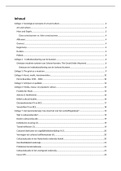Inhoud
College 1: Sociological concepts of art and culture................................................................................3
Art and Culture...................................................................................................................................3
Marx and Engels.................................................................................................................................3
Class consciousness vs. false consciousness...................................................................................4
Althusser.............................................................................................................................................4
Gramsci...............................................................................................................................................4
Hegemony:.........................................................................................................................................4
Du Bois................................................................................................................................................4
Pollock................................................................................................................................................5
College 2 – Institutionalisering van de kunsten......................................................................................6
Ontstaan moderne systeem van Schone Kunsten: The Great Divide (Huyssen).................................6
Ontstaan en institutionalisering van de (schone) kunsten..............................................................6
College 3: The griot as a musician...........................................................................................................9
College 4: Kunst, markt, kunstwerelden...............................................................................................10
Pierre Bourdieu 1930 – 2002............................................................................................................10
College 5: Schrijver en publiek..............................................................................................................13
College 6: Media, massa- en populaire cultuur....................................................................................15
Frankfurter Shule..............................................................................................................................15
Adorno & Horkheimer......................................................................................................................16
British cultural studies......................................................................................................................16
Overeenkomsten FS en BCS..............................................................................................................17
Verschillen FS en BCS........................................................................................................................18
College 7: Het kunstonderwijs: hoe staat het met het verheffingsideaal?...........................................19
Wat is cultuureducatie?....................................................................................................................19
Doelen cultuureducatie....................................................................................................................19
Esthetische ervaring (2)....................................................................................................................19
Transfereffecten (3)..........................................................................................................................19
Cultureel deelname en ongelijkheidsbestrijding (4,5)......................................................................20
Vermogen tot cultureel zelfbewustzijn (6).......................................................................................20
Cultuureducatie in het Nederlands onderwijs beleid.......................................................................20
Overheidsbeleid onderwijs...............................................................................................................21
Problemen kunstonderwijs...............................................................................................................21
Cultuureducatie in het voortgezet onderwijs...................................................................................21
Casus CKV.........................................................................................................................................22
,College 8: Representation and meaning-making..................................................................................23
How do art and culture construct our worlds?.................................................................................23
Constructivism - Positivism...........................................................................................................23
Benhabib..........................................................................................................................................23
Benedict Anderson...........................................................................................................................24
Edward Said......................................................................................................................................24
College 9: Machine of mens? ...............................................................................................................26
Historie.............................................................................................................................................26
College 10: Art and ‘the people’...........................................................................................................28
The people?......................................................................................................................................28
Figurations of the people..............................................................................................................28
How do people participate in art?....................................................................................................28
Shifting relations between artist and audience................................................................................29
Propaganda......................................................................................................................................29
College 11: Art and Solidarity in the Shadow of Decolonization...........................................................30
Art and Solidarity in the Shadow of Decolonization.........................................................................30
Trans-imaginaries of decolonisation case study of Lotus: Afro-Asian writings.................................31
,College 1: Sociological concepts of art and culture
Classic sociological concepts of art and its relation to culture and society; art and culture in theories of
ideology; critiques of the Eurocentrism, racism and sexism of these conceptions
Sruti Bala
Art and Culture
Old French cave painters didn’t see themselves as artist, so art was not necessarily art in the vacuum
of history.
Culture isn’t 1 definition, it is more so a keyword. The meaning of culture is inextricably bound up
with the problems it is used to discuss.
Tensions in culture-theories: (Same idea goes for art)
Culture as a product – culture as a driving force
Culture as a code – culture as a way of doing
Culture as a constraining nature – Culture as an enabling action
So, in which sense is the concept being used, what is the historical context, how can it be understood
differently? There’s not 1 valid idea about culture.
How the relation between art, culture and society has been appraised and conceptualized by various
social and cultural theorists
How to situate art and culture historically
How to analyse the relation between art, culture and society --- case studies and illustrations
How to connect this analysis to cultural practices and institutions, taking into account processes of
production, dissemination and consumption
Marx and Engels
Marx and Engels are authors of the communist manifesto. They are the foundation of communism
and the historical materialism. The point of research is to change something in society.
Historical materialism: Everything needs to be placed in context to change it. This history of society is
the history of suppressed parties who struggle.
Marxist approach to culture and art:
Superstructure: ideas, ideals, beliefs, values, laws and institutions.
Base: the means of production + relations of production
Superstructure legitimises the Base and the Base shapes the Superstructure.
What is the material reality that produces this art style, via struggle? Standards are questioned, what
issues are hidden?
Artistic expressions as active agents of creating and maintaining social order. Following French
Revolution, old standards of good/evil called into question; in melodrama they are restored and
made to appear stable. There’s conflict between the wealthy villains and the poor innocent.
, Class consciousness vs. false consciousness
False: a set of beliefs with which people deceive themselves: power keeps power where the
oppressed wilfully participate in their position. Individuals don’t recognise their injustice
Class: Solidarity and formation of collective sense of subjecthood. Collective understanding of
oppression and underlying structures. Action to change.
False consciousness can be overcome by producing and creating other things, like art.
Althusser
French philosopher – introduced concept of ideology and interpellation (1970)
Follows Marx’s superstructure and base concept, but he thought it was to mechanistic, they’re
autonomous and influence each other ideological, social political, economical practices.
Ideology for Althusser is a lived material practice ideas in action.
Focus: identifying problems and underlying assumptions, motivations, unspoken perception what
is not there, that still has an influence. Conflicting meanings. Identifying the ‘answer which does not
correspond to any question posed’
Gramsci
How did society come to accepting fascism? What is required for revolutionary change? Difference to
orthodox Marxism: revolution won’t last with force, it also needs acceptance. Labour can be mental,
emotional and physical. Culture isn’t secondary, but a unity with politics and economy.
Culture: being lived in particular ways, all expressions are valuable. Not specific cultures but
particular constellations in particular times and places. Culture is how class is lived. All cultural
expressions are valuable. Not stable, bounded entities but fluid and shifting relations. Not all cultural
worlds are systematic, but incoherent, full of contradictions
Hegemony:
Domination by a way of force and consent
Cultural hegemony: ideas brought by a persuasive power. Struggle for hegemony not only a
struggle for institutions of political society, but unquestioned consent of people through institutions
of civil society. Hegemony will never be stable; it will always be contested counter-hegemony
Full consent anthropocentrism
Partial consent liberalism (we live in a free society)
This is a balance between hecemonic cultures (full consent) and subordinate cultures (partial
consent)
Du Bois
Transforms Marx’s false consciousness to his double consciousness. The division of identity is divided
into several facets. It’s conflicting, but also revealing. “It is a peculiar sensation, this double-
consciousness, this sense of always looking at one’s self through the eyes of others, of measuring
one’s soul by the tape of a world that looks on in amused contempt and pity.” (Du Bois, 5). 2 sided
perception to humans.





